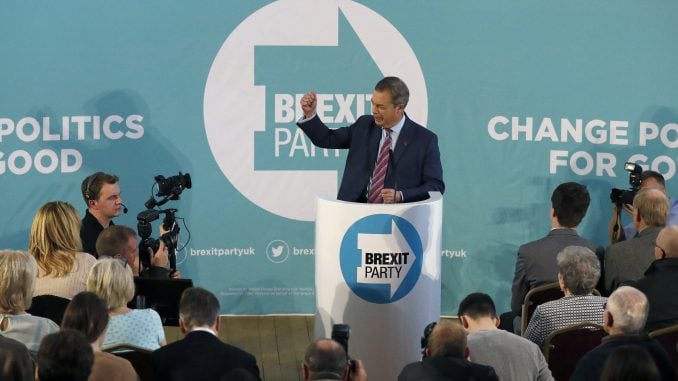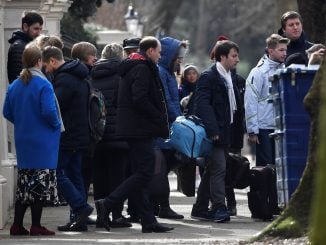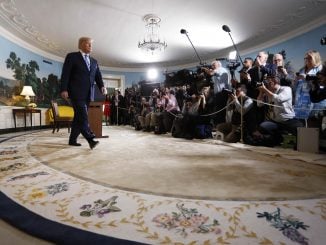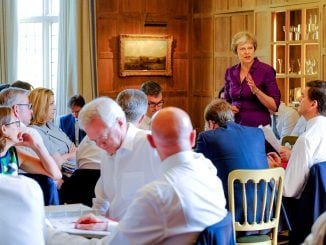
HARTLEPOOL, England — Brexit Party chief Nigel Farage changed course Monday, announcing that his party would not challenge Conservative candidates in nearly half of the U.K.’s districts, a tactical move that may make it easier for pro-Brexit forces to prevail in the Dec. 12 election.
Farage said his party will not put forward any candidates in 317 seats that the Conservatives won in the last election so as not to split the pro-Brexit vote. The move should boost the chances that Prime Minister Boris Johnson’s Conservatives win a majority in an early election that Johnson sought to increase his Brexit mandate.
A Conservative majority would likely mean that Johnson’s Brexit divorce deal would be passed by Parliament, clearing the way for Britain to leave the European Union at the end of January.
Farage said he was putting country before party by unilaterally forming a “leave alliance” with the Conservatives at the expense of parties seeking to slow or even stop Brexit. Those parties include the opposition Labour Party, the anti-Brexit Liberal Democrats and the Scottish National Party.
All 650 seats in the House of Commons are up for grabs in the Dec. 12 election, the first December vote in nearly 100 years. Right now, the governing Conservatives have 298 seats and Labour has 243.
Farage has been under huge pressure from Brexit supporters not to run candidates in seats where there is a risk of splitting the Brexit vote.
“If we field 600 candidates, there will be a hung Parliament,” Farage said, warning that might well lead to another referendum on Britain’s EU membership that could cancel Brexit altogether.
“I think this announcement today prevents a second referendum from happening,” he said. “And that to me, I think right now, is the single most important thing in our country.”
After three years of negotiations and repeated delays, Britain is now scheduled to leave the EU on Jan. 31.
Monday’s move represented a substantial change in tactics, for only last week Farage had threatened to run against the Conservatives in every seat in England, Wales and Scotland unless they agreed to team up with his Brexit Party.
Johnson refused the offer, which included a demand that he drop his Brexit divorce deal.
Labour leader Jeremy Corbyn on Monday called Farage’s decision “a Trump alliance,” saying it reflected a desire to please U.S. President Donald Trump, who had pushed publicly for Farage and Johnson to unite in a pro-Brexit front.
“One week ago Donald Trump told Nigel Farage to make a pact with Boris Johnson,” Corbyn tweeted. “Today, Trump got his wish.”
Corbyn also claimed the “Trump alliance” would allow profit-driven U.S. drug companies to get a foothold in Britain’s financially-stressed National Health Service — a constant theme of his campaign.
Over the weekend, several right-wing British newspapers urged Farage to change tack, saying there was a risk that Britain might not leave the EU if the Labour Party comes to power.
On the campaign trail, Johnson told reporters he was “glad that there’s a recognition” that only his party can get Brexit done. The prime minister said he had not discussed any election deal with Farage.
Earlier in the campaign, Farage had been strongly critical of Johnson’s EU divorce deal — saying it wasn’t a real Brexit — but he softened his tone Monday.
Farage said he had been encouraged by recent comments from Johnson that rule out extending the Brexit transition period beyond the end of 2020. He said the plan now is “to take the fight to Labour,” which he accused of betraying 5 million of its supporters who had voted to leave the EU in the 2016 Brexit referendum.
“The Conservative Party say they want Brexit, but have been taking that in a very questionable direction. But overnight the prime minister signaled a change of direction,” Farage said.
Farage made his announcement in Hartlepool, a former shipbuilding town in northeast England that has voted Labour for more than 50 years, but also voted strongly in 2016 to leave the EU. It is one of the Brexit Party’s top election targets.
While the Brexit Party favors a no-deal exit from the EU and the Conservatives back Johnson’s Brexit deal, Labour has vowed to renegotiate the EU divorce deal. Then Labour says it will hold a new referendum for British voters to decide whether to leave on those terms or remain in the single market of over half a billion people.
Even though the British government desperately wants to leave the EU, the bloc itself desperately wants a new U.K. commissioner on its executive team, even if only for a few months.
EU Commission President-elect Ursula von der Leyen has given British Prime Minister Boris Johnson until the end of the week to come up with a candidate to fill the void at the EU executive, which must have a representative from each member nation.
Even if Johnson has promised to take Britain out of the 28-nation EU by Jan. 31, it would create a legal issue of the U.K. did not have a commissioner in the meantime.
“Time is running out. This is why the president-elect is expecting an answer very soon,” said spokeswoman Dana Spinant. “At any rate, before the end of this week,” she added.
The EU Commission under von der Leyen is slated to start its work on Dec. 1.



